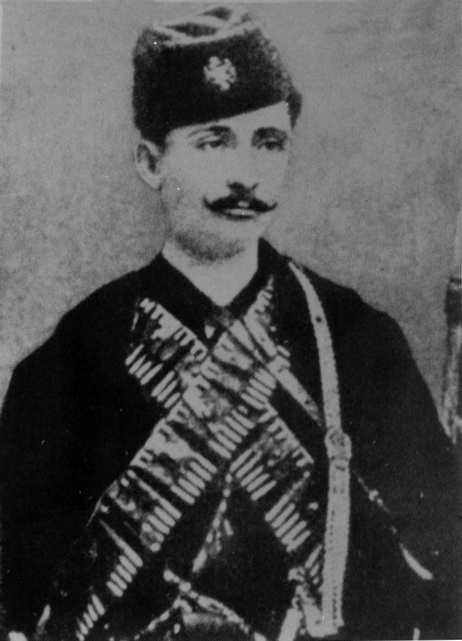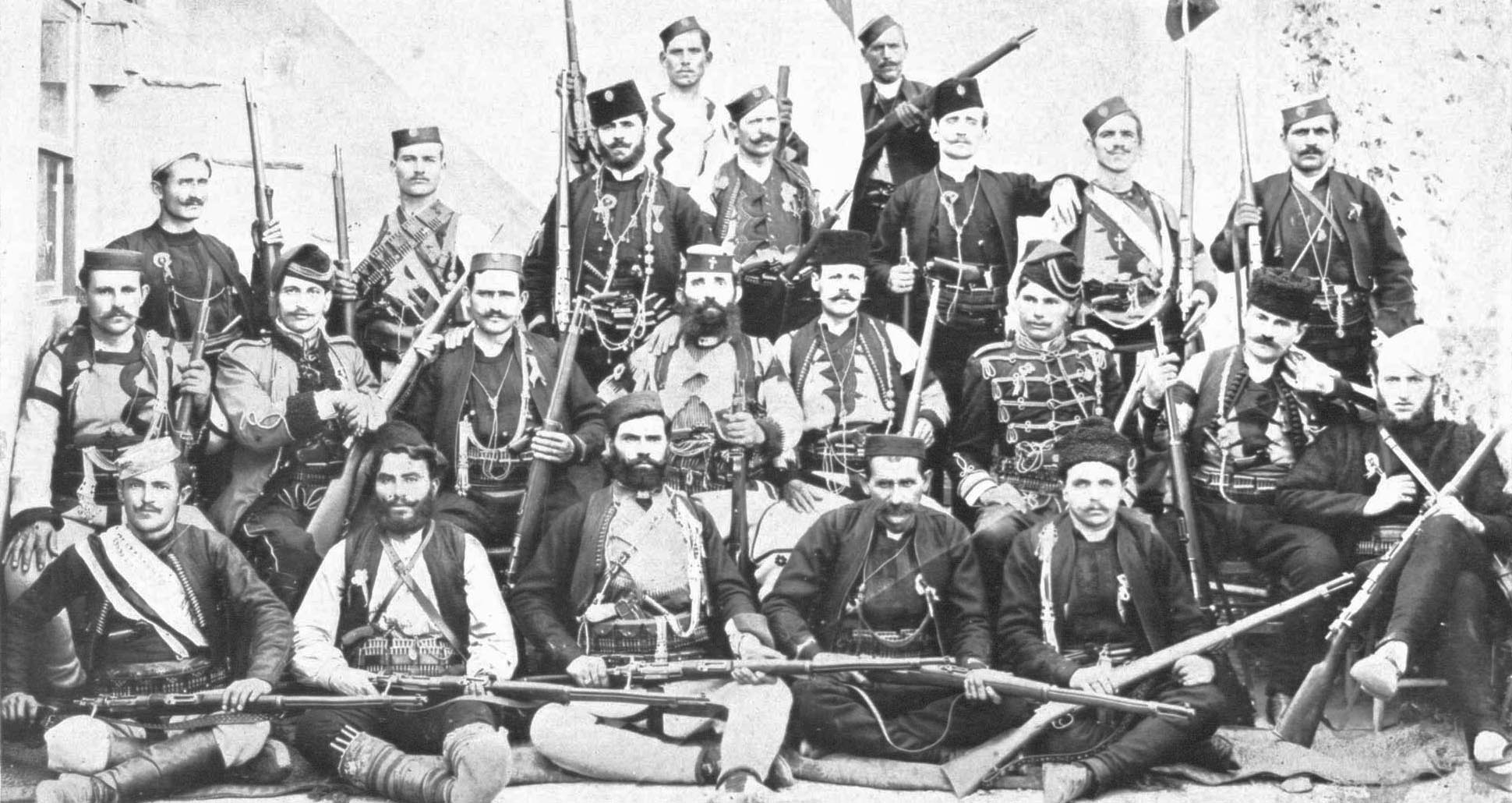|
Petar Koćura
Petar Krstić ( sr-cyr, Петар Крстић), known as Petar Koćura (Петар Коћура) was a member of the Serbian Chetnik Organization. He belonged to the Deda-Stojkovci family in Koćura near Vranje. During the office of Alimpije Marjanović as Chief of the Mountainous Headquarters (1908), the notable regional commanders (''vojvode'') were Koćura, Todor Krstić-Algunjski, Vasilije Trbić, Petko Nagorički, Vojislav Tankosić, Vojin Popović and others. See also * List of Chetnik voivodes This is a list of Chetnik voivodes. VoivodeAlso spelled "voievod", "woiwode", "voivod", "voyvode", "vojvoda", or "woiwod" () ( Old Slavic, literally "war-leader" or "war-lord") is a Slavic as well as Romanian title that originally denoted the prin ... References Sources * {{DEFAULTSORT:Kocura, Petar Chetniks of the Macedonian Struggle 20th-century Serbian people People from Vranje ... [...More Info...] [...Related Items...] OR: [Wikipedia] [Google] [Baidu] |
Serbian Chetnik Organization
Serbian may refer to: * someone or something related to Serbia, a country in Southeastern Europe * someone or something related to the Serbs, a South Slavic people * Serbian language * Serbian names See also * * * Old Serbian (other) * Serbians * Serbia (other) * Names of the Serbs and Serbia Names of the Serbs and Serbia are terms and other designations referring to general terminology and nomenclature on the Serbs ( sr, Срби, Srbi, ) and Serbia ( sr, Србија/Srbija, ). Throughout history, various endonyms and exonyms have bee ... {{Disambiguation Language and nationality disambiguation pages ... [...More Info...] [...Related Items...] OR: [Wikipedia] [Google] [Baidu] |
Koćura
Koćura is a village in the municipality of Vranje, Serbia. According to the 2002 census, the village has a population of 234 people.Popis stanovništva, domaćinstava i Stanova 2002. Knjiga 1: Nacionalna ili etnička pripadnost po naseljima. Republika Srbija, Republički zavod za statistiku Beograd 2003. Chetnik Petar Koćura Petar Krstić ( sr-cyr, Петар Крстић), known as Petar Koćura (Петар Коћура) was a member of the Serbian Chetnik Organization. He belonged to the Deda-Stojkovci family in Koćura near Vranje. During the office of Alimpije Ma ... was born in the village. References Populated places in Pčinja District {{VranjeRS-geo-stub ... [...More Info...] [...Related Items...] OR: [Wikipedia] [Google] [Baidu] |
Vranje
Vranje ( sr-Cyrl, Врање, ) is a city in Southern Serbia and the administrative center of the Pčinja District. The municipality of Vranje has a population of 83,524 and its urban area has 60,485 inhabitants. Vranje is the economical, political and cultural centre of the Pčinja District in Southern Serbia. It is the first city from the Balkans to be declared UNESCO city of Music. It is located on the Pan-European Corridor X, close to the borders with North Macedonia and Bulgaria. The Serbian Orthodox Eparchy of Vranje is seated in the city, as is the 4th Land Force Brigade of the Serbian Army. Etymology The toponym Vranje is first attested in an 11th-century Byzantine text. The town's name is believed to be derived from ''vran'', a word of Slavic origin meaning swarthy or dark, or the archaic Slavic given name Vran, which itself is derived from the same word. History The Romans conquered the region in the 2nd or 1st centuries BC. Vranje was part of Moesia Superior and ... [...More Info...] [...Related Items...] OR: [Wikipedia] [Google] [Baidu] |
Todor Krstić-Algunjski
Todor Krstić ( sr-cyr, Тодор Крстић; 1904–34), known by the nickname Toša (Тоша) and ''nom de guerre'' Algunjski (Алгуњски), was a Serbian Chetnik commander in Old Serbia and Macedonia during the Macedonian Struggle. In Bulgaria he is considered a Bulgarian renegade who switched sides, i.e. (sic) '' Serboman''. Life Krstić was born in the village of Algunja in the Kosovo Vilayet of the Ottoman Empire (present-day North Macedonia). Algunja was surrounded by Albanian-inhabited villages of Čukarka, Suševo and Mutilovo; Krstić had even before joining the organized Chetnik action, jumped into the region from Vranje, assassinating known ''zulumćari'' (persecutors of Christians). On April 18, 1902, together with Krastyo Kovachev, he joined the Bulgarian cheta of the Supreme Macedonian-Adrianople Committee with a commander Sotir Atanasov, which operated in Kriva Palanka area. With this company he moved later to the Bulgarian town of Kyustendil. He ... [...More Info...] [...Related Items...] OR: [Wikipedia] [Google] [Baidu] |
Vasilije Trbić
Vasilije Trbić ( sr-Cyrl, Василије Трбић; 1881 – 1962) was a Serbian Chetnik commander in Macedonia who became a politician in the Kingdom of Serbs, Croats and Slovenes, first representing the People's Radical Party (NRS) in the country's National Assembly and later the Yugoslav National Party (JNP). Born in the village of Bijelo Brdo, near Dalj in Austria-Hungary, Trbić was a monk in his youth. He fled Mount Athos after being accused of murdering several fellow monks and joined the nationalist band of Jovan Drimkolski in 1904–05, quickly becoming the unit's commander. Trbić fought alongside Serbian forces during the Balkan Wars and during World War I, earning the Order of the Star of Karađorđe for his efforts. Acting alongside other former Chetnik commanders, he participated in establishing organizations whose purpose was to raise monuments to Serbian military successes from 1912–18 and to promote cultural development in Macedonia in the interwar per ... [...More Info...] [...Related Items...] OR: [Wikipedia] [Google] [Baidu] |
Petko Nagorički
Petko is a South Slavic (Петко) masculine given name and East Slavic (Петько) surname. It may refer to: Given name *Petko Petkov (other) *Petko Slaveykov (1827–1895), 19th-century Bulgarian poet, publicist, public figure and folklorist *Petko Staynov (1896–1977), Bulgarian composer and pianist *Petko Voyvoda (1844–1900), 19th-century Bulgarian revolutionary * Petko Yankov (born 1977), retired Bulgarian sprinter *Petko Karavelov (1843–1903), leading Bulgarian liberal politician *Petko Ilić (1886–1912), Serbian Chetnik Surname *Svetlana Petko (born 1970), professional Russian football goalkeeper * Serhiy Petko (born 1994), professional Ukrainian football midfielder *Miroslav Petko (born 1995), professional Slovak footballer Geography *Petko Slaveykov (village), a village in the municipality of Sevlievo, in Gabrovo Province, in northern central Bulgaria *Kapitan Petko voyvoda, a village in the municipality of Topolovgrad, in Haskovo Province, in southern ... [...More Info...] [...Related Items...] OR: [Wikipedia] [Google] [Baidu] |
Vojislav Tankosić
Vojislav Tankosić ( sr-cyr, Војислав Танкосић, 20 September 1880 – 2 November 1915) was a Serbian military officer, ''vojvoda'' of the Serbian Chetnik Organization, major of the Serbian Army, and member of the Black Hand, who participated in the May Coup and was accused of involvement in the Assassination of Archduke Franz Ferdinand. Overview Tankosić was born in Ruklada, in the Tamnava region near Valjevo. His family came from Bosnian Krajina. He finished Gymnasium and the prestigious Military Academy. He showed high national consciousness, and gained the trust of Milorad Gođevac and the other Chetnik leaders. Tankosić was sent as a secret agent, undercover, into Ottoman Macedonia to study the terrain and people for future action. As Dragutin Dimitrijević Apis' trustee, he executed Queen Draga's two brothers, in 1903, in the May Coup, which saw the murder (and overthrowing) of King Alexander Obrenović. He participated in the Battle of Čelopek (April ... [...More Info...] [...Related Items...] OR: [Wikipedia] [Google] [Baidu] |
Vojin Popović
Vojin Popović, known as Vojvoda Vuk ( sr, Војин Поповић, војвода Вук; 9 December 1881 – 29 November 1916) was a Serbian ''voivode'' (military commander), who fought for the Macedonian Serb Chetniks (i.e. komiti) in the Struggle for Macedonia, and then the Serbian national army in the Balkan Wars and World War I. Life Vojin was born on 9 December 1881 at Sjenica, Kosovo Vilayet, Ottoman Empire (present-day southwestern Serbia). Shortly after his birth, the family moved to Kragujevac, where Vojin attended school. He chose a career in the military. On 3 November 1901, he became ''second lieutenant''. He was among the first ''cheta'' (bands, 'čete') heading for ''Old Serbia'', i.e. Makedonia (1905). He was killed after being shot through the heart on top of the Staravinski vis near Gruništa, Novaci Municipality in skirmishes after the Battle of Kaymakchalan on 29 November 1916 during the height of World War I. There is a Monument to Vojvoda Vuk in ... [...More Info...] [...Related Items...] OR: [Wikipedia] [Google] [Baidu] |
List Of Chetnik Voivodes
This is a list of Chetnik voivodes. VoivodeAlso spelled "voievod", "woiwode", "voivod", "voyvode", "vojvoda", or "woiwod" () ( Old Slavic, literally "war-leader" or "war-lord") is a Slavic as well as Romanian title that originally denoted the principal commander of a military force. It derives from the word ''vojevoda'', which in early Slavic meant the ''bellidux'', i.e. the military commander of an area, but it usually had a greater meaning. Among the first modern-day voivodes was Kole Rašić, a late 19th-century Serb revolutionary and guerrilla fighter, who led a cheta of 300 men between Niš and Leskovac in Ottoman areas during the Serbo-Turkish War (1876–1878). The others were Rista Cvetković-Božinče, Čerkez Ilija, Čakr-paša, and Spiro Crne. Jovan Hadži-Vasiljević, who knew Spiro Crne personally, wrote and published his biography, ''Spiro Crne Golemdžiojski'', in 1933. Commanders of Old Serbia and Macedonia (1903–1912), Balkan Wars * Kosta Milovanović-P ... [...More Info...] [...Related Items...] OR: [Wikipedia] [Google] [Baidu] |
Chetniks Of The Macedonian Struggle
The Chetniks ( sh-Cyrl-Latn, Четници, Četnici, ; sl, Četniki), formally the Chetnik Detachments of the Yugoslav Army, and also the Yugoslav Army in the Homeland and the Ravna Gora Movement, was a Kingdom of Yugoslavia, Yugoslav royalist and Serbian nationalist movement and Guerrilla warfare, guerrilla force in Axis powers, Axis-occupied Yugoslavia. Although it was not a homogeneous movement, it was led by Draža Mihailović. While it was anti-Axis in its long-term goals and engaged in marginal resistance activities for limited periods, it also engaged in tactical or selective Collaborationism, collaboration with the occupying forces for almost all of the war. The Chetnik movement adopted a policy of collaboration with regard to the Axis, and engaged in cooperation to one degree or another by establishing ''modus vivendi'' or operating as "legalised" auxiliary forces under Axis control. Over a period of time, and in different parts of the country, the movement was progre ... [...More Info...] [...Related Items...] OR: [Wikipedia] [Google] [Baidu] |


